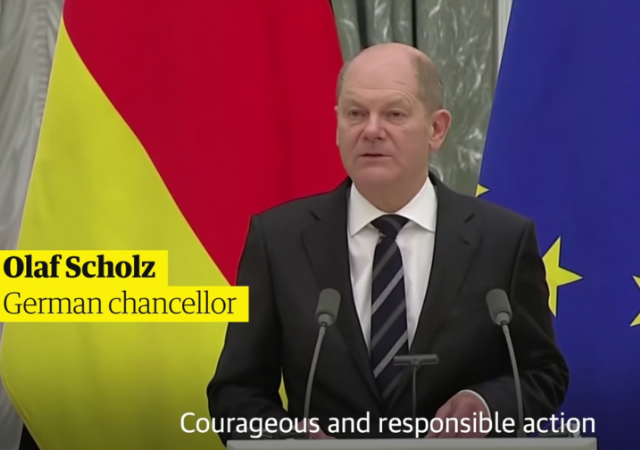Germany Halts Russia’s Nord Stream 2 Gas Pipeline After Putin Recognizes Ukraine’s Separatist Regions

Germany has reacted to the Russian military deployment in eastern Ukraine by halting the Nord Stream 2 gas pipeline. The announcement freezes the nearly-finished $10 billion undersea pipeline that would have cemented Russia’s position as Europe’s top energy supplier.
Berlin’s decision accompanies a slew of sanctions against Russia by the United States, European Union, and other Western nations. The Western response comes as Russian President Vladimir Putin ordered his military into two rebel-controlled regions in eastern Ukraine after recognizing them as independent states.
Tuesday’s move by German Chancellor Olaf Scholz vindicates the stance taken by former U.S. President Donald Trump, who repeatedly cautioned Germans on their growing energy dependence on Russia during his tenure.
The 760-mile Baltic Sea pipeline, nearing its completion, would have supplied Russian gas directly to Germany and the rest of Western Europe. This would have been a game-changer for the Putin regime, making Europe even more energy-dependent on Moscow. More than 40 percent of gas to European Union countries comes from Russia.
Germany’s stare broadcaster Deutsche Welle reported the halting of the pipeline:
German Chancellor Olaf Scholz said Tuesday that Germany has taken steps to halt the process of certifying the Nord Stream 2 gas pipeline from Russia.He told reporters in Berlin that his government was taking the measure in response to Russia’s actions in Ukraine.”That sounds technical, but it is the necessary administrative step so there can be no certification of the pipeline and without this certification, Nord Stream 2 cannot begin operating,” Scholz said. (…)Scholz said Germany’s energy needs would need to be reassessed by the relevant government authority.”The department of the German ministry of economics will reassess the security of our supply needs in light of what has taken place.”
EU, UK Slap Sanctions on Putin
In a rare show of unity, the 27-member European Union “unanimously agreed” on a sanctions package on Russia. The measures will target Russian lawmakers, oligarchs, and state-media outlets.
These are the first in the series of sanctions following Tuesday’s development. European officials dubbed Moscow’s troop movements as an “invasion” of Ukraine and suggested additional sanctions may be on the way, European media reports say.
London-based Financial Times reported the EU and UK sanctions against Russia:
The European Union announced sanctions taking aim at the 351 Duma legislators who voted in favor of recognizing separatist regions in Ukraine, as well as 27 other Russian officials and institutions from the defense and banking world. They also sought to limit Moscow’s access to EU capital and financial markets.“This package of sanctions … will hurt Russia and it will hurt a lot,” EU foreign policy chief Josep Borrell said after chairing a meeting of EU foreign ministers in Paris.“We will make it as difficult as possible for the Kremlin to pursue its aggressive policies,” said EU Commission President Ursula von der Leyen.
Britain, no longer an EU member state, announced its measures targeting Putin’s inner circle.
London-based Financial Times reported the UK sanctions:
UK prime minister Boris Johnson has announced that sanctions will be imposed on five Russian banks and three high net wealth individuals after Vladimir Putin ordered troops into eastern Ukraine.In what he described as the “first tranche” of sanctions, Johnson said all three individuals will have their assets frozen and they will be banned from entering the UK.The three oligarchs targeted by UK sanctions are Gennady Timchenko, Boris Rotenberg and Igor Rotenberg.“Any assets they hold in the UK will be frozen, the individuals concerned will be banned from travelling here and we will prohibit all UK individuals and entities from having any dealings with them,” Johnson said.
Trump Stands Vindicated on Nord Stream 2
While President Biden showed complacency, President Trump repeatedly raised the alarm concerning the ill-advised project. “Germany, as far as I’m concerned, is captive to Russia because it’s getting so much of its energy from Russia,” President Trump cautioned during the July 2018 NATO summit in Europe. Merkel’s Germany pays “billions of dollars to Russia, and we have to defend them against Russia,” he warned, referring to the gas project.
The former president was widely mocked and ridiculed for taking the principled stance. “Trump accused Germany of becoming ‘totally dependent’ on Russian energy at the U.N. The Germans just smirked,” The Washington Post noted on September 25, 2018, referring to a visiting German delegation to the Trump White House.
After taking office, President Biden reversed Washington’s policy towards the Russo-German pipeline, setting aside U.S. objections to the project. British newspaper The Guardian described the lifting of U.S. sanctions on Nord Stream 2 as Biden’s “farewell gift” to outgoing German Chancellor Angela Merkel.
Germany’s political class is deeply invested and entrenched in the Moscow-run pipeline project. Merkel’s predecessor Gerhard Schröder is chairman of the Nord Stream consortium. The Nordstream AG, as it is formally known, is a joint Russian-German-owned entity. The Kremlin-controlled energy giant Gazprom owns 51 percent of the consortium, followed by Germany-based companies Wintershall DEA GmbH and E.ON, which hold 31 percent of the stake.
It is no coincidence that China and Russia are aggressively expanded their sphere of influence since Biden took office. The current U.S. president glaringly displayed his inaptitude and weakness when he ordered a hasty retreat from Afghanistan, practically handing over the country to the Taliban and leaving thousands of stranded U.S. citizens to their mercy. The mainstream media can spin this story any way it wants. Still, the truth remains that under Biden’s leadership, Europe faces its greatest military crisis since the collapse of the Soviet Union.
CLICK HERE FOR FULL VERSION OF THIS STORY